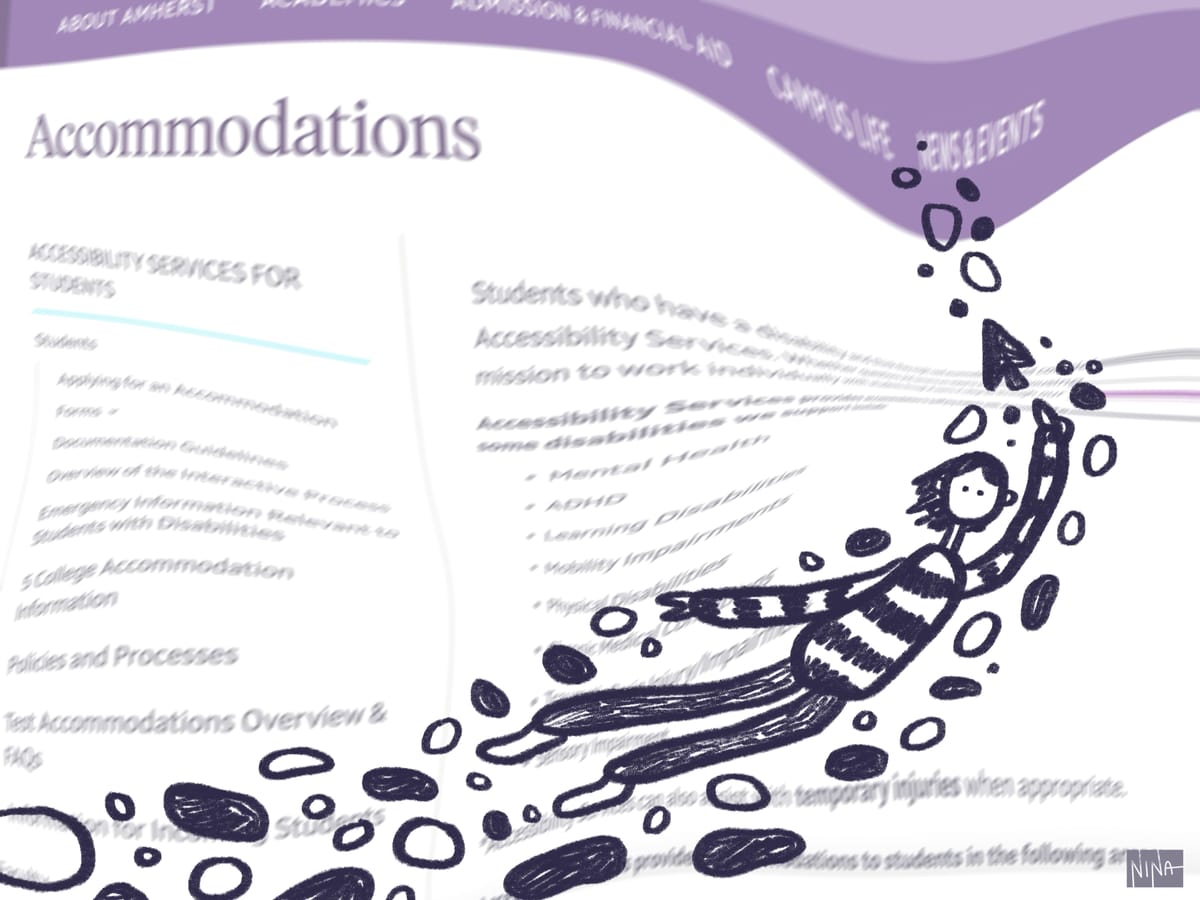Anti-Ableist Amherst: Beyond Accommodations
In this edition of “Anti-Ableist Amherst,” Assistant Opinion Editor Willow Delp ’26 argues that accommodations, though important, are not enough to bring about disability justice at the college.

An easy response to my column Anti-Ableist Amherst is: “What about accommodations?”
Surely, with accommodations, disabled and neurodivergent students can easily thrive. They can receive the support they need to function like abled and neurotypical college students — which, for some, is the desired goal.
Accommodations, however, are only the beginning of building a truly inclusive campus for disabled and neurodivergent people.
Firstly, the accommodations process places the onus on the student. It is the disabled student’s burden to prove that their disability is sufficiently disabling — which may be difficult for students who lack an official diagnosis (for which there are many potential reasons, such as the underdiagnosis of people of color or financial inaccessibility of healthcare). The accommodations process requires that the student do the work to justify the minimum amount of institution-given help — a process which, of course, does not necessarily guarantee the granting of an accommodation. Even for those who do all the “right things,” accommodations are given at the discretion of college administrators — a problematic system even with the most generous people at the helm. With minimal knowledge in the public consciousness on disability and neurodiversity, college faculty may fail to recognize the depth of a student’s needs. As doctorate candidate Kyrs Méndez Ramírez wrote, after being diagnosed with multiple sclerosis, “Once I realized how much work was required for an ‘accommodation,’ I decided against it, instead figuring out ways to take naps during the day (thanks to living near central campus) and scheduling everything around my sleep schedule.” For students already balancing schoolwork while struggling with a disability, the accommodations process might simply be too draining to attempt — or, without official documentation, it can be simply impossible.
Accommodations, furthermore, are granted to students to fit an existing mold. Rather than changing the system to fit students, students are changed to fit the system. Instead of reimagining ways to structurally re-envision campus life through universal design, students are given band-aid solutions that preserve ableist structures. This is done with little awareness of the social impact that accommodations may have on students — how will the student feel, for example, with an uncomfortably visible demarcator of difference (such as being the only student with a to-go box)? With how neurodivergent people are perceived on this campus, getting accommodations can mean that someone is marked as an “other” — an especially terrifying prospect for new students hoping to fit in and make friends.
Personally, my accommodations — as grateful as I am to receive them — have been commonly understood as a privilege, rather than something necessary for me to adapt to a college that was not made with people like me in mind. This trivializing reaction obscures the real needs underlying my accommodations: They exist to minimize my discomfort as a member of a deeply marginalized group. Even so, my accommodations do not prevent me from having to walk long distances up and down hills as a person with chronic leg pain, or make me less exhausted as my medication demands extra hours of sleep; they do not dull my obsessive-compulsions or silence my intrusive thoughts. There are limits to what accommodations can accomplish.
Accommodations do not prevent students from social isolation. They do not educate students about disabled and neurodivergent history and culture, or cultivate a disabled and neurodivergent community. They do not combat systemic ableism. They essentially exist to protect a powerful institution from legal recourse, and for all their benefits, they can do little beyond their most basic function to make campus life just bearable for disabled students. It is no wonder that most college students do not bother informing their college of their disability — after all, accommodations are difficult to receive and can only do so much. If Amherst is to move towards disability justice, we need to look beyond accommodations for liberation — toward disability-inclusive programming as part of academic and student life. Accommodations are only the beginning.


Comments ()